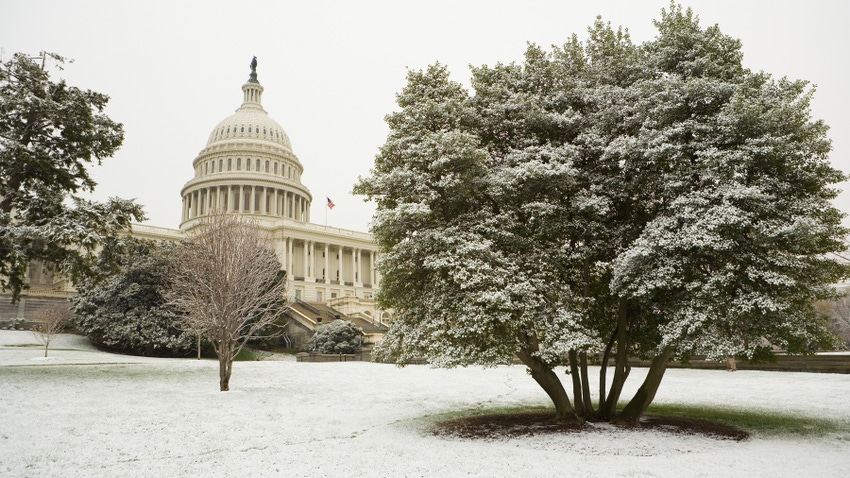January 5, 2024

At a Glance
- The same hardened positions and challenges remain into the new year.
- If something is to be passed before the general election, compromises will need to take place in the first half of the year.
- Rural Nebraskans, in general, support varied categories of the farm bill.
When Congress passed an extension of the 2018 Farm Bill as part of a broader funding package in late 2023, it bought another year to finish the job of enacting new farm bill legislation, but it didn’t make the job any easier.
The farm bill debate bogged down in 2023 over competing priorities and funding challenges, and there have already been comments and accounts of continuing the same hardened positions through 2024.
If a new farm bill is to be finished in 2024, there seemingly will need to be substantial progress and likely substantial compromise in the first half of the year before the campaign for this fall’s general election consumes all of the attention.
If not, then the farm bill seems destined for another late-year scramble after the election in a lame-duck session of Congress, or even another extension to push the issue into a new session of Congress in 2025.
Competing interests
The uncertain prospects for passing a new bill and the competing interests at play offer an interesting policy lesson on the challenges of passing any major legislation, not just a farm bill.
Major legislation typically has multiple parts with multiple and sometimes competing interests engaged in the process. While each interest may know and fight the hardest for their preferences, ultimately the larger bill becomes a complex combination of policies and programs that may be difficult to grasp, even as it attracts a broader consensus of support.
Historically, farm bills were thought to be among the most bipartisan pieces of legislation, with the least difficult political path to completion. For more than 50 years, a broad rural and urban coalition helped support and deliver a farm bill with farm support and food assistance programs as key parts of the bill, along with several other issues and interests.
In recent years, the long-standing rural and urban or farm and food coalition has been tested as broad interests have become more splintered, and each group has argued for more specific programs or directions for the farm bill.
The last two farm bills each failed in a floor vote in the U.S. House of Representatives among both partisan and parochial splits before they were ultimately salvaged and passed. The 2023 debate started with many of the same competing interests and conflicts, including an ongoing debate over food assistance that already played out in the debt-ceiling debate in early 2023, and the appropriations process over the summer before Congress ever got to a formal farm bill debate.
What Nebraskans say
Recent survey results from the annual Nebraska Rural Poll help illustrate the challenge of competing interests and broad coalitions at play in a farm bill debate.
A rural farm state such as Nebraska would generally be presumed to be a staunch supporter of farm legislation, and the latest poll of rural Nebraskans (outside the Lincoln and Omaha metro areas) shows they generally favor the various parts of a farm bill — from farm income safety net programs to conservation, food assistance, ag trade promotion, rural development, and research and education among major titles in the bill.
However, the poll also shows that even among rural Nebraskans, the majority are generally unfamiliar with the farm bill. Only 34% of respondents indicated they were very or at least somewhat familiar with the legislation, and the only occupational group to report more than 50% familiarity with the legislation was, not surprisingly, agriculture.
Further analysis shows widespread support for farm income safety net programs (73%). That support carries across most demographic breakouts in the poll, suggesting it comes not only from farm interests, but also from rural Main Street interests and others with a stake in the ag economy.
Conservation programs have strong support as well at 79%, with the highest levels of support coming from higher-income, younger or more educated respondents. The report doesn’t directly answer the question of whether staunch conservation supporters favor conservation programs and ag programs or conservation programs instead of ag programs.
However, that distinction exists nationally and helps explain some of the debate over whether supplemental conservation dollars targeted at climate practices should or should not be reallocated more broadly.
Support for food assistance and broader food policy also provides interesting insight into a farm bill debate. A majority of poll respondents (61%) support domestic food assistance programs, although the support is lower than for farm and conservation programs.
The lower support may stem from a general perception that food assistance is the “urban” part of a farm bill, and thus less relevant to rural places, although food security and assistance statistics would suggest the issue is very relevant to rural places as well.
It may also reflect the current debate over federal spending in general, and the ongoing debate over food assistance spending, in particular, given the reality that food assistance is the single biggest bank account within the farm bill.
Specialty crops and local food
Another area that attracts support from food interest groups is the broad category of specialty crop and local food system programs. Over the past two decades, federal support for specialty crops and more diversified programs for organic, sustainable, local, value-added and other food systems have grown to be an important part of the farm bill.
A similar share of rural poll respondents (65%) supported programs focused in these areas, as they did those focused on food assistance, although the breakout of support varies somewhat across demographics.
Nationally, these priorities seem to divide among the traditional “foodie” groups that have pushed food assistance to address food (in)security, hunger and poverty as part of a decades-old farm bill coalition, and the “neo-foodie” or “new foodie” groups that champion a new food systems approach for federal policy.
These groups have not necessarily battled against each other in farm bill debates, but they definitely have different approaches to working with ag groups and other interests as part of a broad farm bill coalition (credit to Dr. Keith Coble of Mississippi State University for the original discussion of these competing interests as part of the 2014 Farm Bill debate).
With all of the various parts of a farm bill and the various competing interests that support them, perhaps it should not be surprising that there is broad support for farm bill programs, even as there is a general lack of familiarity with the farm bill as a whole.
Whether the competing interests can find any compromise or consensus and build a coalition to support an overall farm bill, or whether they remain a champion of only their own issues, will largely dictate whether a farm bill can reach the finish in the coming year.
Lubben is the Extension policy specialist at the University of Nebraska-Lincoln.
Read more about:
Farm BillAbout the Author(s)
You May Also Like






